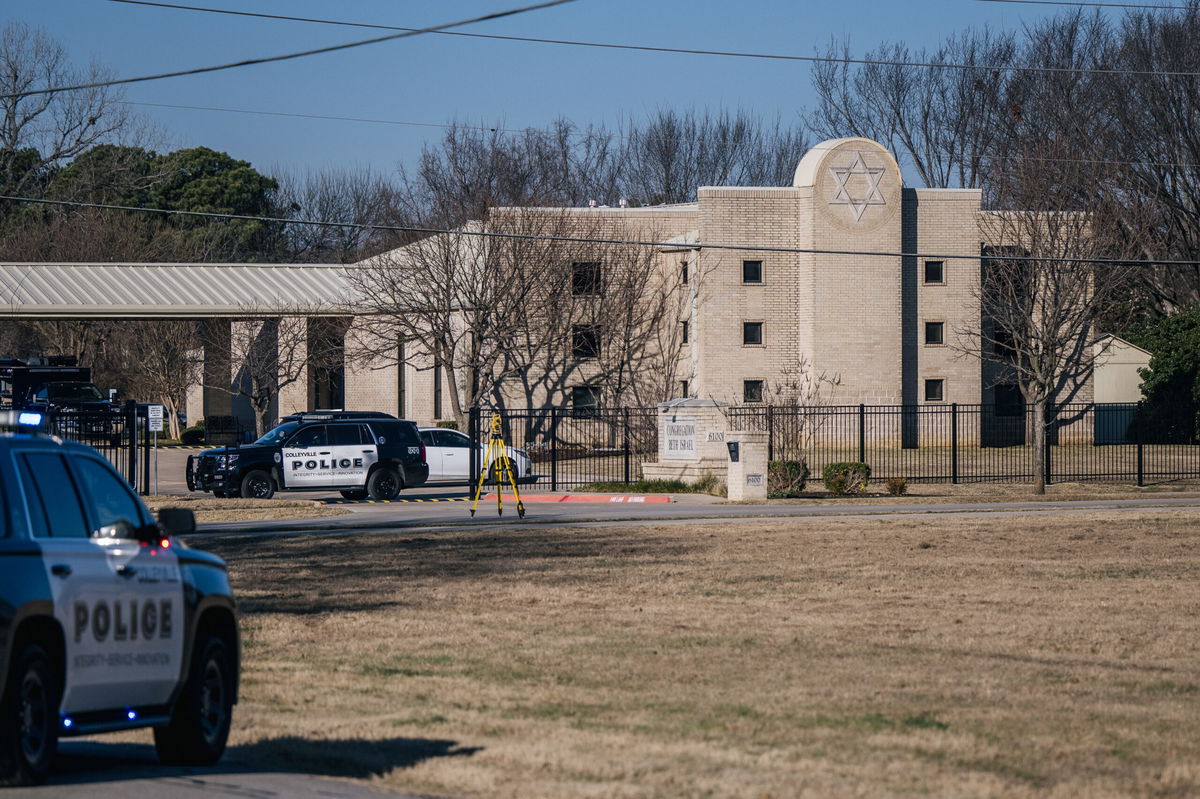Justice Department charges a man who allegedly sold a gun to the Texas synagogue hostage-taker

Police vehicles sit outside of Congregation Beth Israel Synagogue in Colleyville
By Tara John, Paul P. Murphy and Allegra Goodwin, CNN
Federal prosecutors have charged a 32-year-old man with a federal firearm crime, alleging he sold the Colleyville, Texas, synagogue hostage-taker the gun he used during this month’s 11-hour standoff.
Henry Williams, who was charged Tuesday with being a felon in possession of a firearm, allegedly sold a semiautomatic pistol to Malik Faisal Akram on January 13, according to a criminal complaint.
Two days later, Akram, a 44-year-old British national, held four people hostage at Congregation Beth Israel, the FBI has said. An FBI team killed him after hostages were released or escaped from the synagogue near Dallas, officials said. The FBI is treating the incident, which has put US Jewish communities on edge, as a hate crime and an act of terrorism.
Williams had his initial court appearance Wednesday, court records show. CNN has reached out to his attorney.
FBI agents and local authorities worked “around the clock” to figure out how Akram got his weapon, Matthew DeSarno, the special agent in charge of the FBI’s Dallas field office, said in a statement. The question had been their investigation’s “primary gap,” DeSarno said last week in a news conference.
Authorities identified Williams by analyzing Akram’s cell phone records, which showed the two called each other several times between January 11 and 13, according to the complaint. When authorities first approached Williams on January 16, he told federal investigators that he met with a man who had a British accent but did not remember the man’s name, the complaint said.
Agents interviews Williams again after he was arrested on an outstanding state warrant and showed him a photo of Akram, and he confirmed that was the person he sold the handgun to, the complaint said.
The complaint added Williams “stated that Akram told him the gun was going to be used for intimidation as Akram represented that he wanted it to try and get money from someone who had an outstanding debt with him.”
Williams was previously incarcerated for aggravated assault with a deadly weapon and attempted possession of a controlled substance, according to the complaint. He remains detained ahead of Monday pretrial detention hearing.
“Federal firearm laws are designed to keep guns from falling into dangerous hands. As a convicted felon, Mr. Williams was prohibited from carrying, acquiring, or selling firearms,” US Attorney Chad Meacham said in a statement. “Whether or not he knew of his buyer’s nefarious intent is largely irrelevant — felons cannot have guns, period, and the Justice Department is committed to prosecuting those who do.”
Men arrested in UK as part of investigation
Also Wednesday, two men were arrested in the English city of Manchester as part of an investigation into the Texas synagogue standoff, Greater Manchester Police said. UK counterterrorism investigators have been helping US authorities look into the incident.
One of the men was released Thursday, Greater Manchester Police said in a statement. The other man remains in custody, police said.
Last week, two men were arrested in Birmingham and Manchester in connection with the standoff investigation and were held for questioning, Greater Manchester Police said at the time without elaborating.
US investigators believe Akram was motivated in part by a desire to see the release of extremist Aafia Siddiqui, who is serving an 86-year federal prison sentence in Fort Worth, Texas, they’ve said. She was not involved in the Colleyville standoff, her attorney said.
Akram arrived in the United States in late December via New York’s John F. Kennedy International Airport, a US law enforcement source familiar with the investigation told CNN.
Akram was known to UK security services and was the subject of a brief investigation in 2020, a UK official told CNN. The investigation was closed when authorities determined Akram was no longer a threat.
The incident has raised concerns among Jewish communities across the United States. Attacks on Jewish people have been on the rise, the Anti-Defamation League warns. And while the majority of anti-Semitic incidents involve harassment and vandalism, assaults have also happened, with at least six turning fatal since 2016, including at Pittsburgh’s Tree of Life synagogue in 2018.
The-CNN-Wire
™ & © 2022 Cable News Network, Inc., a WarnerMedia Company. All rights reserved.
CNN’s Tara John and Allegra Goodwin reported from London, and Paul P. Murphy reported from New York.
